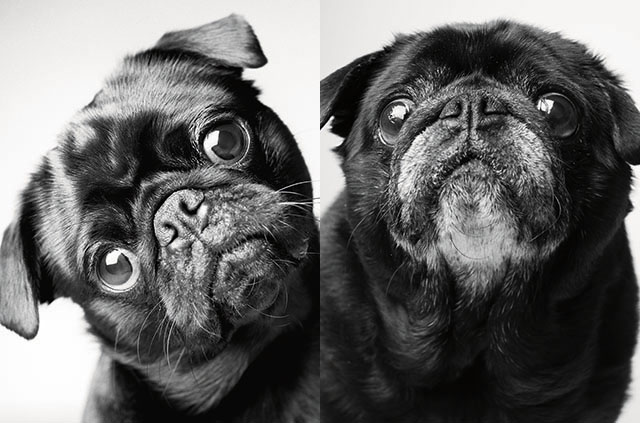- This article has been reviewed by a pet health professional. It is not a substitute for professional veterinary advice.
How many candles should you put on your dog’s birthday cake? The classic response is that one dog year equals seven human years; however, this is a myth, and calculating your dog’s age is a bit more complicated.
Knowing your dog’s age isn’t just for fun; it’s key to determining what kind of vet care your pup needs, especially when it comes to working out how often they need wellness visits to pinpoint underlying health problems.
Below, we’ll examine how to calculate dog years to human years and how to keep them happy and healthy, whatever their age.
Where Did The “7-Year-Rule” Come From?
Some professionals speculate that the “rule” was a marketing ploy from the 1950s, designed to encourage pet parents to bring their pups for regular vet checks. Even so, this myth persists simply because it’s so well-known.
“The 7-year rule is widely recognised as a myth because it oversimplifies the ageing process of dogs, which is much more nuanced and varies by breed and size,” explained Dr Jessica Apted, Regional Medical Director at Sploot Veterinary Care.
Now that science has progressed, research has found that pups age differently from humans. While we have a relatively steady growth rate, canines age much faster during their early years, slowing down as they age.
Age Chart: Dog Years to Human Years
Instead, use a size-specific age chart or research-backed formulas. The chart below looks at your dog’s age and estimate human age by breed size.
| Dog Size | Small | Medium | Large | Giant |
| Age | Age In Human Years | |||
| 1 | 15 | 15 | 15 | 15 |
| 2 | 24 | 24 | 24 | 22 |
| 3 | 28 | 28 | 28 | 38 |
| 4 | 32 | 32 | 32 | 38 |
| 5 | 36 | 36 | 36 | 45 |
| 6 | 40 | 42 | 45 | 49 |
| 7 | 44 | 47 | 50 | 56 |
| 8 | 48 | 51 | 50 | 56 |
| 9 | 52 | 56 | 61 | 71 |
| 10 | 56 | 60 | 66 | 79 |
| 11 | 60 | 65 | 72 | 86 |
| 12 | 64 | 69 | 77 | 93 |
| 13 | 68 | 74 | 82 | 100 |
| 14 | 72 | 78 | 88 | 107 |
| 15 | 76 | 83 | 93 | 114 |
| 16 | 80 | 87 | 99 | 121 |
Dog Age to Human Age Math Formula
Additionally, Dr Apted recommends using the natural logarithm formula developed by researchers: [human_age = 16ln(dog_age) + 31]
Using this human years to dog years calculator:
- A two-year-old dog is 42 human years old.
- A five-year-old dog is 56.8 human years old.
- A 10-year-old dog is 67.8 human years old.
However, researchers who developed this calculation only used one breed in their research, Labrador Retrievers.
Even so, Dr Apted noted that both of the above methods “account for the fact that dogs age more rapidly in their early years and more slowly later on, offering a more nuanced approach than the oversimplified 7-year rule.”
Whatever method you use to estimate your pup’s age in human years, the most effective way to help them live a long life is to care for their health and well-being
Why Do Dog Breeds Age Differently?
Why does your Great Dane seem to slow down around six years old, while your neighbour’s Cocker Spaniel is still acting like an exuberant puppy at the same age? Dog breeds age differently, and their size largely determines this process.
“Different dog breeds age differently due to a variety of factors, including genetics, size, and overall health,” said Dr Kathryn Dench, Chief Veterinary Advisor at Paw Origins. Larger breeds grow more rapidly than smaller breeds, which also means they age faster.
“Many large breed dogs might be considered ‘seniors’ by the age of six, whereas small breeds may not reach this life stage until well into their double digits,” Dr Dench says. That means when calculating your pup’s age, it’s crucial to account for their size.
5 Tips for Healthy Dog Ageing & Longevity
Now that you know your pup’s true age, it’s time to help them age healthily. Here’s what the experts recommend:
- Balanced diet: Tailored to your dog’s breed and life stage.
- Regular exercise: At a suitable level for your dog’s age, breed, and health status.
- Routine vet care: Senior dogs should have bi-annual wellness exams, as opposed to one exam a year for adult dogs.
- Mental stimulation: To help keep your dog’s mind sharp.
- Know the signs of ageing in dogs: To help you get the right care at the right time.
While it can be sad to think of your pup ageing, Dr Dench says to celebrate every stage of their life and understand that ageing is not a disease but a natural process. Plus, the best thing of all: “The bond between a pet and their [parent] can grow even stronger in these golden years, with each day bringing new opportunities for connection and love”, Dr Dench adds.



